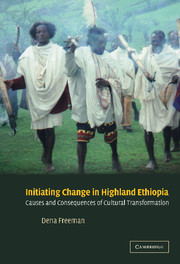Book contents
- Frontmatter
- Contents
- List of illustrations
- Acknowledgements
- Select glossary
- 1 Introduction: theorising change
- 2 The recent history of the Gamo Highlands
- 3 Production and reproduction
- 4 The sacrificial system
- 5 The initiatory system
- 6 Experiencing change
- 7 Assemblies and incremental cultural change
- 8 Transformation versus devolution: the organisational dynamics of change
- Notes
- Bibliography
- Index
8 - Transformation versus devolution: the organisational dynamics of change
Published online by Cambridge University Press: 22 September 2009
- Frontmatter
- Contents
- List of illustrations
- Acknowledgements
- Select glossary
- 1 Introduction: theorising change
- 2 The recent history of the Gamo Highlands
- 3 Production and reproduction
- 4 The sacrificial system
- 5 The initiatory system
- 6 Experiencing change
- 7 Assemblies and incremental cultural change
- 8 Transformation versus devolution: the organisational dynamics of change
- Notes
- Bibliography
- Index
Summary
We have seen how the changing production patterns in the nineteenth and twentieth centuries led to new social and economic realities in the lives of people in Doko and how people's individual strategies for change became translated into incremental cultural change by creative problem-solving and the innovatory ideas generated at the communal assemblies. It now remains to see how the cumulative effects of such incremental cultural change could result in overall structural change, or transformation. The primary aim, then, of this chapter is to show how the Doko Masho halak'a initiations could have transformed from the ‘warrior’ form to the ‘wife’ form. Having done this, we will need to return to the question of why the Doko Gembela initiations did not transform in the same way and also consider the more general question of why the practices of the sacrificial system seem altogether more resistant to transformatory change.
Cultural transformation: from warrior to wife
Let us quickly recap some of the major themes that have been developed in the previous chapters. We have seen that in the mid to late nineteenth century Doko existed as one unified dere and the groupings of Doko Masho and Doko Gembela did not exist. At this time most men were farmers and there was a very unequal pattern of land distribution such that genealogical seniors and the descendants of senior lines owned large amounts of land, which was farmed predominantly by slaves who had been captured in inter-dere warfare.
Information
- Type
- Chapter
- Information
- Initiating Change in Highland EthiopiaCauses and Consequences of Cultural Transformation, pp. 151 - 168Publisher: Cambridge University PressPrint publication year: 2002
